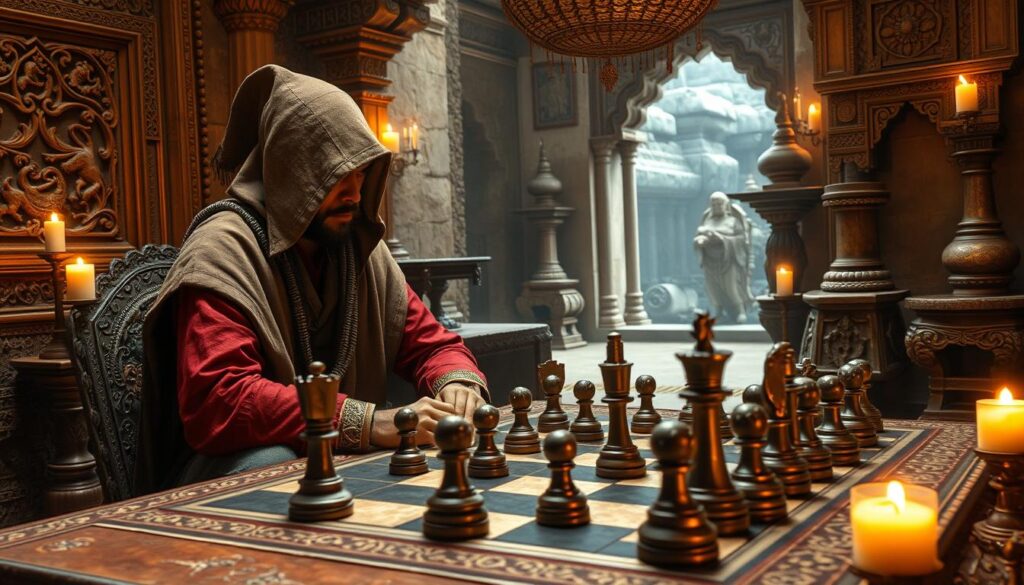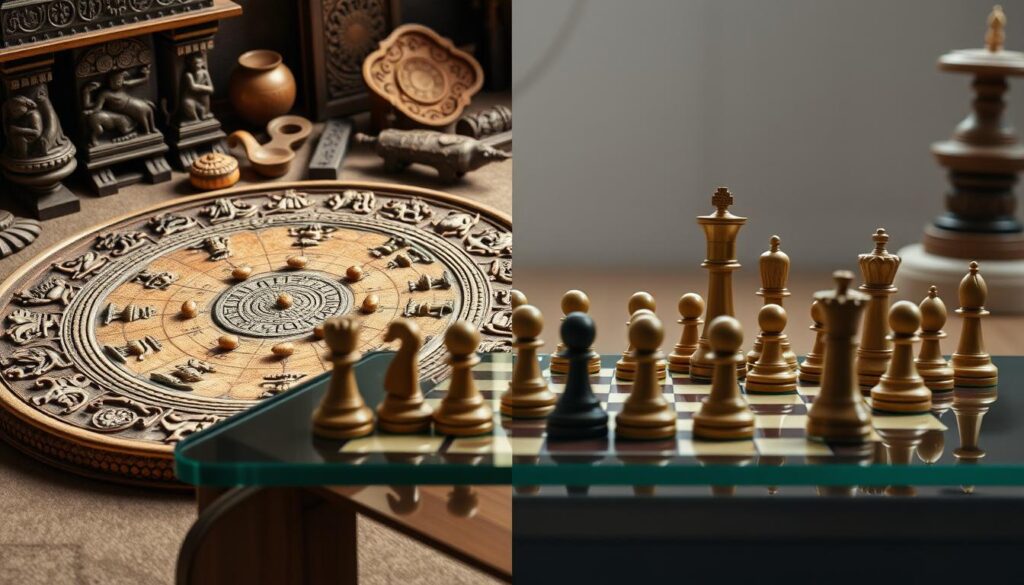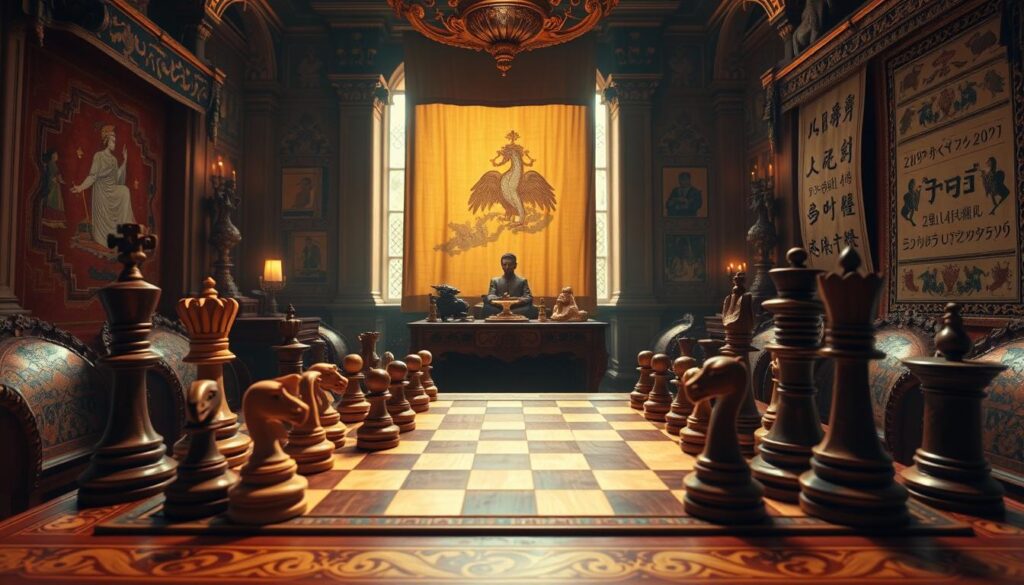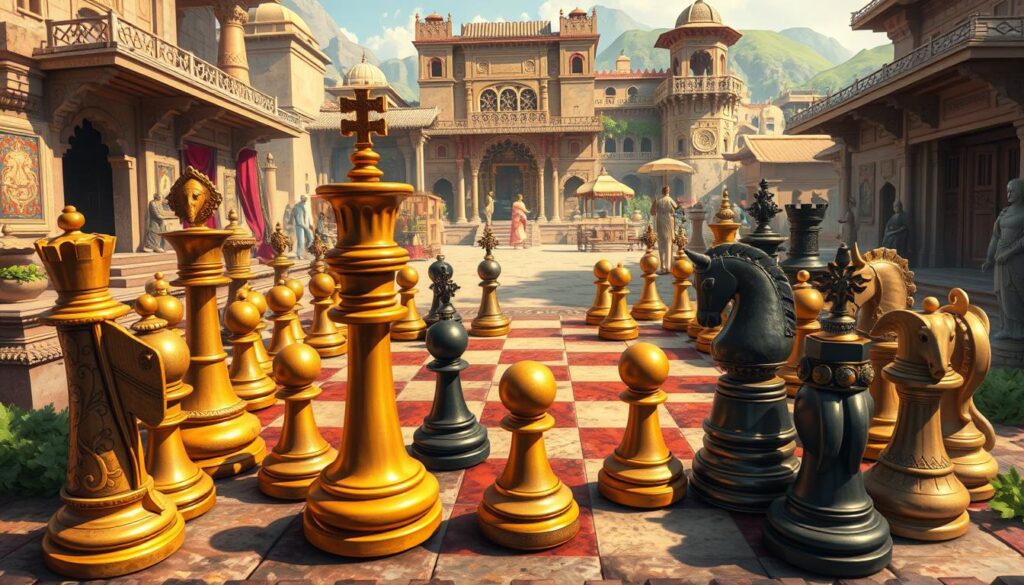Ever wondered who invented chess? The game’s history is long, starting with chaturanga in India over 1,500 years ago. While we don’t know who made the first chess board, its journey is intriguing. For centuries, people have tried to figure out who came up with chess. As you learn about its beginnings, you’ll see how chess has grown and what makes it special today.
Table of Contents
The Mystery Behind Who invented chess
Who invented the Chess Game?
Exploring chess history reveals a complex question: who invented the game? The origins of chess are mysterious, with many theories and legends. Yet, one fact is clear: chess has evolved over 1500 years, influenced by many cultures.
The Indian theory suggests chess started in the Gupta Empire around the 6th century AD. This is backed by chaturanga, an early chess-like game from India. Chaturanga means “four divisions of the military,” showing its strategic depth.
Other theories point to the Persians or Chinese as chess creators. The Persian theory says chess began in Persia in the 6th century AD. The Chinese theory suggests China was the birthplace around the same time. Despite these theories, who invented chess remains a topic of debate.
Some key facts about chess origins include:
- The oldest recorded chess game dates back to the 10th century.
- The term “Checkmate” comes from the Persian “ShahMat,” meaning “King is Defeated.”
- Chess spread to North Africa, Sicily, and Spain, and to Russia by the 10th century AD.

As you explore chess origins, you’ll find a rich and complex history. The story of who invented chess is fascinating, whether you love chess or just history.
| Theory | Origin | Time Period |
|---|---|---|
| Indian Theory | India | 6th century AD |
| Persian Theory | Persia | 6th century AD |
| Chinese Theory | China | 6th century AD |
From Chaturanga to Modern Chess: A Journey Through Time
Who Invented the Game of Chess?
Exploring chess history takes you from ancient roots to modern games. The origins of chess are traced back to around 600 AD. The first version, Chaturanga, came from northern India or southern Central Asia. It showed the four military divisions: infantry, cavalry, elephantry, and chariotry.
Chess has a history of over 1,400 years, with big changes in the 15th century. New pieces like the queen and bishop were added then. This made chess known and loved across Europe. The chess history is filled with interesting changes, making it the game we love today.
Some key moments in chess’s evolution include:
- The emergence of Chaturanga in India around 600 AD
- The development of Shatranj in Persia, which integrated rules more similar to modern chess
- The introduction of new pieces, such as the queen and bishop, in the 15th century
- The standardization of chess sets and the introduction of chess clocks in the 16th century
The inventor of chess is unknown, but the game has changed a lot. Today, chess is loved by millions worldwide. It’s a popular sport, with big tournaments and online games.

As you learn more about chess, you’ll see its deep history and cultural value. From its start to now, chess has grown into a game that fascinates players everywhere.
| Century | Development |
|---|---|
| 6th | Emergence of Chaturanga in India |
| 15th | Introduction of new pieces, such as the queen and bishop |
| 16th | Standardization of chess sets and introduction of chess clocks |
The Cultural Significance of Early Chess
Exploring early chess reveals its deep impact on society and culture. The chess origin story begins in ancient India in the 6th century, known as Chaturanga. It was played on an 8×8 board, symbolizing the four divisions of the ancient Indian army. This history is truly captivating.
The game spread to Persia, becoming Shatranj, and then to Europe, where it was loved by nobility. Chess’s cultural importance is seen in art, literature, and culture. It’s mentioned in works like Lewis Carroll’s “Through the Looking-Glass” and Stefan Zweig’s “The Royal Game.”

Chess’s influence goes beyond language and culture, fostering global connections through tournaments. With its vast cultural heritage, chess remains a beloved game, enjoyed by millions globally.
Chess’s cultural significance includes:
- Its link to intelligence and strategic thinking
- Its role in education and culture
- Its ability to enhance critical thinking, problem-solving, and patience
How Chess Spread Across Ancient Civilizations
Exploring chess’s global journey reveals how it spread across ancient civilizations. It started in India about 1500 years ago, during the Gupta Empire. Then, it moved to Persia, China, and Europe, showing its global appeal and lasting popularity.
The story of chess’s spread is intriguing. It shows how the game adapted to local cultures and traditions. Who invented the game chess is a mystery, but its history is rich and varied. Chaturanga, from 6th century India, is seen as chess’s early form.
Here are some key milestones in chess’s spread:
- Chess reached China by about 750 CE and later Japan and Korea by the 11th century CE.
- The first recorded European game is from a 10th-century manuscript.
- By the 10th century, it was introduced to North Africa, Sicily, and Spain by Muslim travelers.

Chess has a history spanning over 1,400 years, showing its lasting appeal. who invented chess is still debated, but its global reach is undeniable. As you learn more about chess’s history, you’ll see its impact on cultures worldwide.
| Region | Time Period | Key Events |
|---|---|---|
| India | 6th century CE | Chaturanga flourished, precursor to modern chess |
| Persia | 7th century CE | Game spread from India, adapted and modified |
| China | 750 CE | Chess reached China, then spread to Japan and Korea |
The Evolution of Chess Pieces and Rules:
Exploring the origins of chess is fascinating. It started in ancient India as chaturanga, played with six unique pieces by the 7th century. These included the Raja (King), Mantri (Minister), Gajah (War Elephant), Ashva (Horse), Ratha (Chariot), and Padati (Footsoldier). Over time, the game changed, and the Persian version, chatrang, renamed some pieces, like the Raja becoming the Shah.
The journey of chess pieces and rules is intriguing. who invented chess in India is a mystery many have tried to solve. As chess spread, it changed a lot, adding new pieces and rules. The queen, once the vizier, got her powerful move in the 15th and 16th centuries, replacing older versions.
The game became more standardized with the Staunton chess set in 1849. This set, now the global standard, has pieces with unique designs. This makes it easier to tell them apart. The historical origins of chess show its rich and varied history, shaped by many cultures.
Some important moments in chess’s evolution include:
- The introduction of castling, En passant, and a more powerful Queen in the 16th century.
- The development of modern chess strategies and tournament formats.
- The creation of the Staunton chess set, which became the standard for chess sets worldwide.
The chess origin story is a captivating journey through time. It shows how chess has grown, influenced by many cultures. As you learn more about chess, you’ll uncover its deep history and the people who shaped it.
Famous Historical Chess Sets and Artifacts(who invented the board game chess)
Exploring chess history (who invented the game of chess)reveals the captivating tale of famous chess sets and artifacts. Chess originated in ancient India and has evolved over time. Different cultures have contributed to its development. Despite debate, it’s clear chess is deeply rooted in human culture.
The Lewis Chessmen, a set of 93 gaming pieces, are a key part of chess history. These medieval pieces, from the late 12th or early 13th century, were found on the Isle of Lewis. They are now in the British Museum. Made from walrus ivory and sperm-whale teeth, they show the skill of the time.
Chess has left a lasting mark on culture through various artifacts. The Lewis Chessmen and other sets show the game’s enduring appeal. Chess has been a symbol of skill and strategy in elite medieval society. Its evolution reflects the influence of many cultures, blending art, strategy, and history.
Some interesting facts about the Lewis Chessmen include:
- The chessmen likely came from Norway, with connections to medieval Norwegian church carvings.
- Made from walrus ivory and sperm-whale teeth, some pieces have detailed carvings.
- Estimated to be from around A.D. 1150-1200, they are a crucial part of chess history.
Studying chess history and its origins is both fascinating and captivating. As you explore who invented chess, you’ll uncover its rich cultural heritage. You’ll see how chess has shaped human history.
Chess Legends and Historical Grandmasters
As you explore chess, you’ll meet many chess legends. They’ve shaped the game into what we know today. The mystery of who invented chess is still out there. Yet, the impact of these legendary players is clear.
Players like Paul Morphy and Magnus Carlsen have left their mark. Each brought their own style and strategy to the game. They’ve inspired countless players and fans.
The history of chess is filled with amazing stories. Emanuel Lasker, for example, was world champion for 27 years. That’s the longest reign in chess history.
Other greats, like Garry Kasparov and Anatoly Karpov, have also made big contributions. Karpov’s record against Kasparov is impressive, with 19 wins, 21 losses, and 104 draws.
Some of the most famous chess legends include:
- Paul Morphy, known for his victories in the 1857 American Chess Congress and his undefeated streak in Europe in 1858
- Tigran Petrosian, who was world champion from 1963 to 1969 and undefeated in 1962
- Magnus Carlsen, the current world champion, who has held the title since 2013
These players, among many others, have shaped chess into what it is today. They’ve inspired new generations of players and fans. As you explore who invented chess, you’ll find many more chess legends. You might even become one yourself.
| Player | Years Active | Notable Achievements |
|---|---|---|
| Paul Morphy | 1837-1849 | Won the 1857 American Chess Congress, undefeated in Europe in 1858 |
| Tigran Petrosian | 1929-1984 | World champion from 1963 to 1969, undefeated in 1962 |
| Magnus Carlsen | 1990-present | World champion since 2013, highest-rated player of all time |
How Chess Transformed into a Global Phenomenon
Exploring the chess origin story shows how the game has grown. It has become a worldwide phenomenon. The early history of chess is filled with cultural richness. It was introduced to many places, showing its global appeal.
The mystery of who invented chess game is still out there. But its impact on society is clear. Online platforms have made chess more accessible. Millions of games by top players are available for analysis.
Chess clocks and standard rules have also helped spread the game. Some key moments in chess’s global journey include:
- Over 200% increase in user registrations on Chess.com in recent years
- The first officially recognized World Chess Championship match in 1886
- The inaugural Candidates Tournament in 1950
Chess is seen as a game of strategy and intellect. As you learn about the chess origin story and its early history of chess, you’ll see its global impact. It has inspired players worldwide, making it a global phenomenon.
Conclusion: The Timeless Legacy of Chess
As we wrap up our exploration of who invented chess, it’s evident that this game has deeply impacted human history. From its origins in who invented chess game to its widespread love today, chess shows our lasting interest in mental challenges.
The story of chess history is both captivating and long, crossing many cultures and centuries. It has evolved from Chaturanga in ancient India to the modern Staunton design. These changes highlight chess’s lasting appeal and ability to adapt.
Now, chess draws players from all over, thanks to digital tools and AI. Yet, the charm of a real chess set remains strong. It offers a unique experience that combines touch and thought. Looking ahead, chess’s legacy will surely inspire more minds, keeping the spirit of strategy and curiosity alive.







